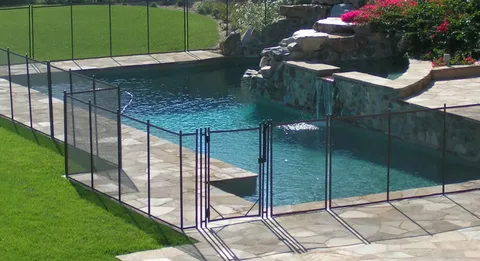Installing a pool fence is not just about safety—it’s also about durability, maintenance, and how well the material withstands your local climate. Whether you’re facing humid summers, snowy winters, or dry heat, knowing how to choose the best pool fence material for your climate can save you money, time, and effort in the long run.
Why Climate Matters When Choosing Pool Fencing
Different materials react differently to weather elements. For instance, metal may rust in humid environments, while wood can warp or rot in wet conditions. That’s why selecting a material based solely on looks or cost can backfire if it isn’t suitable for your weather patterns.
Understanding how to choose the best pool fence material for your climate starts with identifying the unique environmental challenges in your region.
Best Pool Fence Materials by Climate Type
1. Hot and Dry Climates
Recommended Material: Aluminum or Vinyl
In regions with high temperatures and minimal rainfall, such as the Southwest U.S., materials need to withstand UV exposure and dryness.
- Aluminum: Rust-resistant, doesn’t fade easily, and requires minimal maintenance.
- Vinyl: UV-stabilized vinyl can handle intense sun without cracking or discoloring.
Avoid wood in dry climates, as it can become brittle and crack over time.
2. Humid or Coastal Climates
Recommended Material: Powder-Coated Aluminum or PVC
Humidity and salty air near the coast can cause metal to rust and wood to rot.
- Powder-Coated Aluminum: Resistant to rust and corrosion.
- PVC (a type of vinyl): Impervious to moisture and salt, making it ideal for wet environments.
Avoid untreated iron or steel, which corrodes quickly under these conditions.
3. Cold and Snowy Climates
Recommended Material: Composite or Aluminum
Snow and ice can damage fencing materials through moisture absorption and freeze-thaw cycles.
- Composite Fencing: A mix of wood fibers and plastic, it resists cracking and warping.
- Aluminum: Maintains structural integrity in cold weather and doesn’t rust.
Wood fences may require regular sealing to withstand cold, wet conditions.
4. Mild or Temperate Climates
Recommended Material: Wide Range
If you live in a region with balanced weather, such as much of the Pacific Northwest, you have more flexibility.
- Wood: With proper maintenance, it’s a classic and attractive option.
- Vinyl: Low-maintenance and durable in most conditions.
- Aluminum: Always a safe, long-lasting choice.
Other Considerations Besides Climate
Even when focusing on how to choose the best pool fence material for your climate, don’t forget these factors:
- Local regulations: Check codes for height and spacing.
- Aesthetics: Match your fence with your home’s design.
- Maintenance: Some materials require regular care; others don’t.
Conclusion
Understanding how to choose the best pool fence material for your climate is essential for making a smart, long-term investment. By considering your local weather patterns, maintenance requirements, and personal preferences, you can ensure your fence is both functional and lasting. Whether it’s the sun-resistant durability of vinyl, the rust-proof elegance of aluminum, or the natural beauty of treated wood, there’s a perfect match for every climate.

